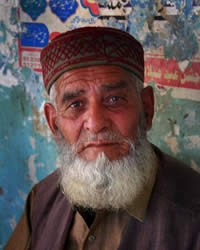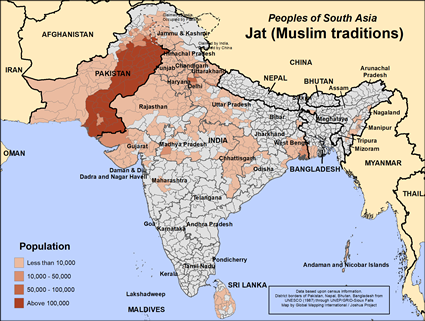Jat (Muslim traditions) in India

Photo Source:
Steve Evans - Flickr
Creative Commons
|

Map Source:
People Group data: Omid. Map geography: UNESCO / GMI. Map Design: Joshua Project.
|
| People Name: | Jat (Muslim traditions) |
| Country: | India |
| 10/40 Window: | Yes |
| Population: | 778,000 |
| World Population: | 19,096,000 |
| Primary Language: | Urdu |
| Primary Religion: | Islam |
| Christian Adherents: | 0.00 % |
| Evangelicals: | 0.00 % |
| Scripture: | Complete Bible |
| Ministry Resources: | Yes |
| Jesus Film: | Yes |
| Audio Recordings: | Yes |
| People Cluster: | South Asia Muslim - Jat |
| Affinity Bloc: | South Asian Peoples |
| Progress Level: |
|
Introduction / History
The Jat people are a historical Indo-Aryan tribal group native to the Punjab region.
We do not know when the Jat people established themselves in the Indian desert. By the 4th century they had spread to the Punjab.
Jat people have a history of being brave and ready fighters. They are fiercely independent in character and value their self-respect more than anything, which is why they offered heavy resistance against any foreign force. The Jat lifestyle was designed to foster a martial spirit. Whenever they lost their kingdoms, Jat people retired to the countryside and became landed barons and the landlords with their swords girded round their waists. They would draw the sword out of the scabbard at the command of their panchayat to fight with the invaders.
The Jats rose to prominence following the 1669 Jat uprising against Mughal rule, and they ruled various princely states throughout the 18th century. After 1858, under the British Raj, the Jats were known for their service in the Indian Army, being categorized as a "martial race" by the British, specifically in the Jat Regiment, the Punjab Regiment and the Sikh Regiment.
According to earlier censuses, the Jat people accounted for approximately one-quarter of the entire Sindhi-Punjabi speaking area, making it the "largest single socially distinctive group" in the region. In 1931, the date of the last census of the British Raj before the abolition of caste, they were distributed throughout rorth India, mostly in the Punjab and Rajputana. Today, the largest population center is located in the Punjab region, Haryana and Rajasthan. There are also smaller distributions across the world, due to the large immigrant diaspora.
What Are Their Lives Like?
The Jat people are one of the most prosperous groups in India on a per-capita basis (Punjab, Haryana, and Gujarat are the wealthiest of Indian states).
In the government of their villages, they appear democratic. They have less reverence for hereditary right and a preference for well-chosen elected headmen. Jats have dominated as the political class in Haryana and Punjab. A number of Jat people belonging to the political classes have produced many political leaders, including the 6th Prime Minister of India, Prime Minister Chaudhary Charan Singh.
The Jat people are required to marry within their community. Widow marriage is not only permitted and practiced but is also a social obligation. The joint family system was popular amongst the Jats and large families used to share the same house and hearth. With the advancement of modern civilization, as people are becoming less dependent upon each other, the joint family system is becoming less prominent.
What Are Their Beliefs?
Muslim Jat people are from the Sunni branch of Islam. They believe that the supreme God, Allah, spoke through his prophet, Mohammed, and taught mankind how to live a righteous life through the Koran and the Hadith. To live a righteous life, you must utter the Shahada (a statement of faith), pray five times a day facing Mecca, fast from sunup to sundown during the month of Ramadan, give alms to the poor, and make a pilgrimage to Mecca if you have the means. Muslims are prohibited from drinking alcohol, eating pork, gambling, stealing, slandering, and making idols. They gather for corporate prayer on Friday afternoons at a mosque, their place of worship.
The two main holidays for Sunni Muslims are Eid al Fitr, the breaking of the monthly fast and Eid al Adha, the celebration of Abraham's willingness to sacrifice his son to Allah.
Sunni religious practices are staid and simple. They believe that Allah has pre-determined our fates; they minimize free will.
In most of the Muslim world, people depend on the spirit world for their daily needs since they regard Allah as too distant. Allah may determine their eternal salvation, but the spirits determine how well we live in our daily lives. For that reason, they must appease the spirits. They often use charms and amulets to help them with spiritual forces.
What Are Their Needs?
These people need to realize that they cannot please God without being empowered by the Holy Spirit. They cannot have the Holy Spirit without Jesus Christ.
Prayer Points
Pray for a movement of Jesus to heal and strengthen Muslim Jat communities.
Pray for a "Book of Acts" type of movement to Christ among the Muslim Jat.
Pray for the Muslim Jat people to understand and embrace that Jesus wants to bless their families and neighborhoods.
Pray for Holy Spirit anointed believers from the Muslim Jat people to change their society from within.
Pray for a movement in which the Holy Spirit leads and empowers disciples to make more disciples.